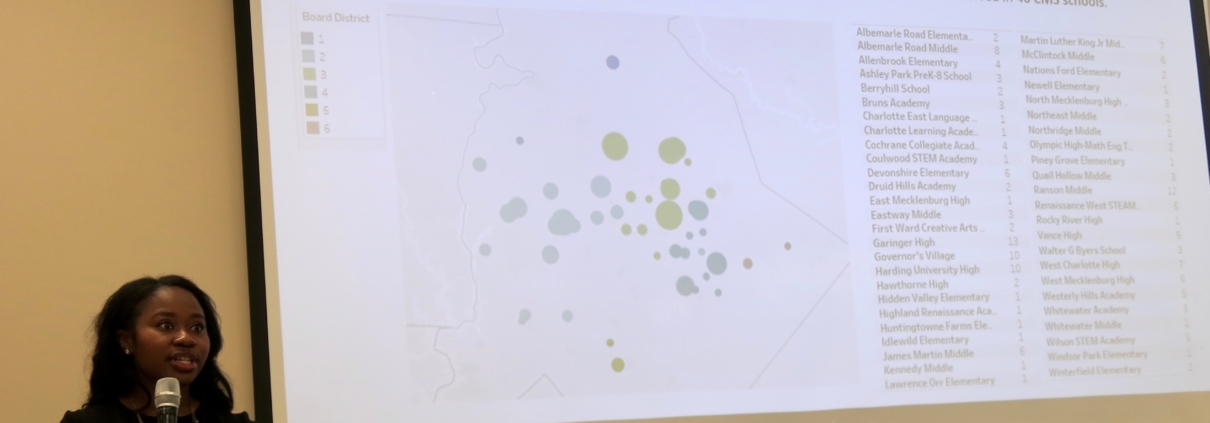As an organization, we are always interested in community events and try to engage with community members as much as possible. Charlotte’s Tuesday Morning Breakfast Forum (TMBF), as the collective describes it on their website, “shares with all present ‘information of importance to the African American community in particular and the rest of Charlotte in general,’” with regular attendees come from different business, educational, and political backgrounds.
TMBF was started in 1980 due to low voter turnout and declined interest in local affairs. These meetings are moderated by co-founder Sarah Stevenson, where speakers and questions are timed so that attendees are informed and are able to speak up about their concerns. TMBF continues as a means to promote dialogue and progress regarding the many issues in government today.
Last Tuesday, July 2nd, the guest speaker was Crystal Rountree, the Executive Director of Teach for America (TFA) Charlotte-Piedmont Triad. As an organization serving school districts, foundations, and non-profits, we were especially interested in the conversation regarding the national, regional, and local impact of TFA and their next steps.
One of the many interesting points brought up in the conversation was the zoning laws and the influence of that on school mapping. Charlotte Mecklenburg Schools (CMS) has shifted from enrolling neighborhood students to busing in students from across the city, and back. Charlotte had struggled with desegregation despite the 1957 landmark case of Brown v. Board of Education, and it wasn’t until the 1969 ruling of Swann v. CMS Board of Education that CMS was ordered to come up with a plan to end segregated schools: busing students of different races as an effort of integration. Charlotte soon became one of the most integrated schools for the next three decades through their busing system.
Then in the late 1990s, a White parent sued CMS when he believed that his daughter was not admitted into a magnet school because of her race. Even though CMS forcefully defended their desegregation plan, in 1999, Federal District Court ordered CMS to stop using race in student assignment decisions. CMS was fearful of seeing 30 years of desegregation work being wiped away and appealed the decision, but in 2001, the Fourth Circuit Court of Appeals ended the mandatory busing program.
What came out of this was the “Family Choice Plan,” where students had to attend the schools in their neighborhood, with options to attend magnet schools. The problem with this was that neighborhoods in Charlotte are deeply segregated, so schools that were once integrated and high-achieving soon became segregated by race and income. In a 2018 report released by the North Carolina Justice Center’s Education and Law Project, it had calculated that CMS would need to reassign 55% of its students to achieve racial parity across its schools, thus making it the most racially segregated school district within North Carolina. In another 2018 report released by CMS, “Breaking the Link,” it cites that White students in low-poverty schools have the best shot at getting top-notch teachers and graduating ready for college, while Black and Hispanic students in high-poverty schools are left behind.
Not only does this have an impact on the school pride and traditions of many families, as one community member points out, but this also has an impact on TFA corps members coming into the classroom. As Crystal points out, it is the relationship building that each corps member does that keeps them teaching, and engaged in the work for educational equity. Not only is there an impact on the colored student being bused to a non-neighborhood school, but there is also an impact on the white student, as they emerge themselves into a world of diversity. Studies have also shown that students in integrated schools are more likely to enroll and graduate from college.
Our current education system is an opportunity crisis, and we must be persistent with coming up with solutions. We need to approach this with a systemic theory of change, working on both the inside and outside of schools. TFA is a collective leadership of alumni: some stay in the classroom after their two years and continue to teach at their placement school, others use their knowledge of what happens inside of school buildings and make the most impact.
Action Steps
- Read more about CMS’s desegregation and integration here.
- Consider joining us at the next Tuesday Morning Breakfast Forum at the Belmont Regional Center, on July 23rd, where Dr. Wilcox (superintendent of Charlotte-Mecklenburg Schools) will be there!

